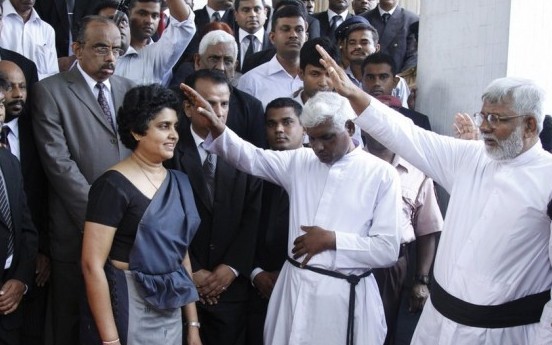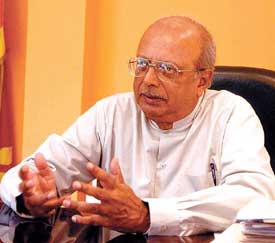Rape of the Constitution – Murder of the Supreme Court
A Supreme Court that has, in Judge Weeramantry’s estimation, been “a great pride to the country and has been highly esteemed both Domestically and Internationally” is faced with the threatened ignominy of sudden extinction.
The character of “Braveheart” who dared to retrieve the irretrievable, if not fatal damage caused
to the esteem of the Supreme Court, has been effectively assassinated and the assassins duly rewarded with “plum patronage appointments”.
The politicisation of the Judiciary that commenced with the Republican Constitution of 1972 and continued under the 1978 Constitution was arrested and reversed by Chief Justice Samarakoon, an “outsider” who was able to command the respect of the entire judiciary by his firm but fair actions carried out unobtrusively. When the Executive found that the Judiciary was keeping the Executive within their legally defined boundaries and was a hindrance to their brazen manipulations, it sought the connivance of the servile legislature to impeach the Chief Justice. This move was thwarted by a few MPs who had the courage of their convictions and took a stand for Justice and fairplay.
With the retirement of this “outsider” the Judiciary was deprived of strong leadership and “patronage appointments” to the Judiciary resumed. The commitment and resolve to resist extraneous considerations steadily weakened and corrupt practices proliferated due to weak leadership and overt patronage from the powerful Executive. The process of Court was increasingly abused by seemingly lawful acts of sections of the Bench and Bar. Had Raja Wanasundera J and Mark Fernando J been duly appointed Chief Justice, this slide would have been arrested and reversed. But the Executive ensured the subservience of the Judiciary by making patronage appointments at will.
The end of the 20th Century saw the “fast-tracking” of blatant overt corruption in the Judiciary with the patronage appointment of Sarath N. Silva as Chief Justice. His exploits as Chief Justice are too well known by the Sovereign People of this Country, to need any recounting. He escaped certain impeachment by appealing to his political guardian (the President) to prorogue and then dissolve Parliament. Having successfully politicised the Official Bar as Attorney General, he made startling headway in politicising the Private Bar and even the Judiciary.
He outsmarted J.R.Jayawardena by mis-interpreting the relevant Constitutional provisions to permit Opposition MPs to crossover to the Government at will, without losing their seats in Parliament. He revelled in issuing permits for sand-mining, directing the UGC to admit under-qualified candidates to Faculties of their choice, and directing the Judiciary to deliver judgments as desired by him. However, he overreached himself by purporting to decide on the retail price of Petrol. When he had to step down in mid – 2009, the Judiciary was in shambles.
In patent intentional violation of the Constitutional provisions under the 17th Amendment, President Rajapaksa conferred on Asoka Silva J the patronage appointment of Chief Justice. This Chief Justice zealously carried out the dictates of the Executive without reversing any of the myriad unjust and unlawful acts of his predecessor.
Having successfully repealed the 17th Amendment and enacting the 18th Amendment to replace it, there was no Constitutional barrier to prevent the President from making a “patronage appointment” of his choice as Chief Justice. However, this was conferred on the only other “outsider” to be appointed to the Supreme Court after Samarakoon CJ, viz. Bandaranayake J who was, in any event the most senior Supreme Court Justice.
Contrary to the expectations of the President this bravehearted lady CJ set about undoing the extensive damage caused to the Judiciary with the active support of most Judicial Officers, in her typically unobtrusive and gentle, but firm manner. Covert and even overt pressure from the Executive was politely but firmly resisted. The President was in no mood to let the aura of an all-conquering, all powerful ruler, slip or diminish in any manner. His grandiose vision of omnipotence could not be dimmed. She could not be permitted to be a thorn in his flesh for eleven more years. She had to be impeached, come what way!
If, as Senior Minister Tissa Vitharana believed, Bandaranayake J had truly requested the
President to give a “patronage appointment” to her spouse, then all that the President needed to do was to charge her, even belatedly, with sexually harassing him into making this “patronage appointment”. There was no need to direct/permit his elder sibling, the Speaker, to get 117 MPs to sign a blank sheet of paper and thereafter fabricate 14 misconceived charges.
The fact that the President has not done so leads to the inevitable conclusion that Tissa Vitharana has surely mis-heard or mis-interpreted what the President had in fact told him. On the contrary Vitharana not only continues to believe this but has also convinced his fellow-professional Vasudeva Nanayakkara to vote with him for the impeachment.
Where does all this manipulation leave us? The Supreme Court, in the exercise of its sole and exclusive jurisdiction to interpret the Constitutional provisions governing the limits of the powers specifically delegated to or conferred upon the legislature by the Sovereign People via. the currently valid Constitution, has unambiguously ruled that the power to decide on the guilt of a Judge can only be conferred by a law and not by Standing Orders of Parliament.
The Deputy Speaker, a lawyer himself, declared unequivocally that the mandate given to the PSC by Parliament was strictly limited to investigation and report only, and specifically excluded arriving at any finding of guilt. The necessary implication is that the Speaker’s celebrated ruling on the matter was restricted to any proceedings of the PSC in respect of that specific mandate.
The Court of Appeal, in spite of death threats received, quashed the PSC findings on the CJ. The Speaker who had, on 8th December, 2012 already announced in the House that the CJ had been found guilty of 3 Charges refrained from making the much publicised ruling that he was to make on 8th January. The Deputy Speaker, lawyer, in a drastic departure from his confident assertion re the limitation of the mandate given to the PSC, speaking on behalf of the legislature said the impeachment motion has been already placed on the Parliamentary agenda of business scheduled for this week and nobody could reverse it. He also said that there was no need for a ruling by the Speaker as he had already made a ruling re notices to appear in Court.
Disregarding the unambiguous rulings of the Courts, the legislature, relying on the Speaker’s interpretation of the Constitution, now plead that they are powerless even to postpone the debate, based on an arbitrary finding of guilt by the PSC, admittedly outside the mandate issued to the PSC. Even if, as claimed by the Deputy Speaker, Standing Orders do not provide for removal of an item placed on the agenda, the inherent power of Parliament certainly empowers them to save valuable Parliamentary time, by avoiding the discussion of a nullity.
Taking a vote and purporting to confer validity to a finding already quashed by the Courts will be tantamount to a total breakdown of Law and Order and invalidate any claims to democratic government. Sri Lanka is on the brink of disaster! The only option available to a Statesman confronted with a situation such as this, is to somehow avoid such a catastrophe, by respecting the Court Orders and suspending further proceedings on the impeachment until a lawful procedure is put in place. The President can, if he wants to, act like a Statesman, or turn a blind eye, and continue to assert that “The Supreme Court had no right to go against the legislature” in accordance with his own interpretation of the Constitution, whilst at the same time reiterating his respect for the independence of the Judiciary as a Senior Attorney-at-Law. The choice between serenity and certain turmoil is now in his hands. The ensuing few hours will determine the future of our blessed motherland.
The writer is an Attorney-at-Law, founder CIMOGG and a past president OPA


